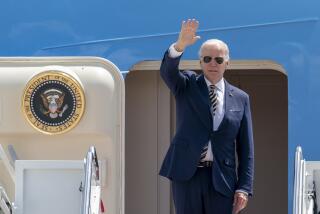NEWS ANALYSIS : He Used Asia Trip to Stress Point : Quayle Stays Skeptical of Moscow’s Changes
ELMENDORF AIR FORCE BASE, Alaska — For nearly two weeks, touring 22,490 miles along the Pacific Rim, Vice President Dan Quayle has been playing counterpoint.
“In Washington, the talk almost entirely, at least the public talk, has been about arms control” and progress in U.S.-Soviet relations, Quayle said in an interview Friday morning as Air Force Two flew east over the North Pacific toward home.
Quayle’s message at virtually every stop in his four-nation tour has provided a sharp contrast.
Speaking to several thousand U.S. troops at Misawa Air Base in northern Japan, the closest U.S. airfield to Soviet territory, Quayle put it this way: “There is a widespread perception of a remarkable change of Soviet objectives and therefore a decrease in the threat to the United States.”
But while the changes in the Soviet Union have been “startling” militarily, he went on, “the facts so far do not provide any comforting evidence that the Soviet Union has undergone a fundamental transformation.”
Washington may be celebrating the end of the Cold War, but Dan Quayle is not yet ready to party.
The contrast illustrates one of the chief roles the vice president has taken on--as a conservative advocate within the Administration of skepticism toward Soviet intentions.
“I don’t think it’s pouring cold water on perestroika ,” Quayle said in an interview earlier on the trip, referring to Soviet President Mikhail S. Gorbachev’s reform effort. “I think it’s just being realistic.”
Secretary of State James A. Baker III and National Security Adviser Brent Scowcroft are also cautious skeptics about the Soviets. But they have spent much of the Administration’s first nine months concentrating on Europe and arms control, the central front of Soviet-American relations.
Quayle, by contrast, has concentrated on regional issues, particularly in Latin America and Asia, on the indirect proxy conflicts between the superpowers and their allies where the progress in U.S.-Soviet relations has been far less.
Reticence Was on Display
Quayle’s focus on issues of military security has placed him in sharp contrast, too, with Administration officials and members of Congress who concentrate on the differences between the United States and its allies on issues such as trade. That reticence was on display during the first two stops on Quayle’s trip--Korea and Japan.
In Japan, Quayle deliberately downplayed trade friction in favor of emphasizing the permanence of the U.S.-Japan security alliance and the expanding nature of the two nation’s “global partnership.”
“Right now, we are from time to time at each other’s throats” on trade issues, Quayle said in Friday’s interview. “It’s not good. We need to foster that relationship for the future.”
As an example of potential future cooperation, Quayle announced in Tokyo two modest agreements with the Japanese on space cooperation. He also went out of his way to praise Japanese Prime Minister Toshiki Kaifu, whose political position is weaker than that of almost any Japanese leader in the postwar era. And while Quayle scheduled meetings with opposition leaders in South Korea and the Philippines, he avoided doing so in Japan.
Just as he downplayed trade conflicts with Japan, Quayle walked lightly around the issue of human rights violations in South Korea, praising President Roh Tae Woo for his “moderation.”
Quayle’s approach, of course, has a potential downside. Critics of Japanese trade practices believe that Japan poses a threat to U.S. economic security that must be combatted directly.
But for now, Quayle and his aides feel that their way is working.
And the concentration on security issues fits well with the strong anti-communism that is a big part of the vice president’s upbringing and political background. It is a concentration for which Asia provided numerous supporting illustrations.
At the final stop of his trip Thursday in Malaysia, Quayle visited a camp for Vietnamese refugees. He lifted a girl into the air as she smiled and waved a small American flag. And he called on Hanoi to try Gorbachev-style “perestroika and glasnost (openness) in Vietnam.”
Favorite Topic Discussed
Malaysia also provided Quayle an opportunity to discuss the Asian regional conflict in which he so far has taken the most direct interest--the continued civil war in Cambodia. There, a Vietnamese-backed government faces the strong military opposition of the Khmer Rouge and much weaker opposition from two non-Communist resistance groups.
With Vietnam withdrawing its troops from Cambodia after almost 11 years, U.S. analysts and Southeast Asian governments fear that the Khmer Rouge may quickly make a drive for power, U.S. ambassadors from around the region told Quayle in a meeting Thursday in Kuala Lumpur.
Within the Administration, Quayle has been one of the most consistent advocates of providing military aid to build the non-Communist opposition groups into a third force that could take power.
Critics of aiding the resistance argue that these groups have virtually no influence in Cambodia. Backing them against the existing regime, they add, would only ease the return to power of the Khmer Rouge, which is blamed for the deaths of more than 1 million Cambodians in the 3 1/2 years before the Vietnamese invasion of 1978.
In the interview Friday, Quayle rejected that argument.
“It’s hopeless if you say it’s hopeless,” he said. “If we don’t support them, there’s no way they’re ever going to get stronger.”
More to Read
Get the L.A. Times Politics newsletter
Deeply reported insights into legislation, politics and policy from Sacramento, Washington and beyond. In your inbox three times per week.
You may occasionally receive promotional content from the Los Angeles Times.











